Albert Nelson
b. April 25th, 1923 in Indianola (Mississippi)
d. December 21st, 1992 in Memphis (Tennessee)
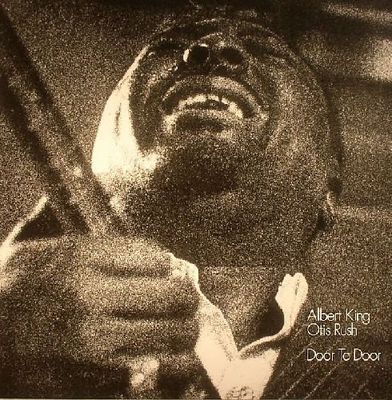
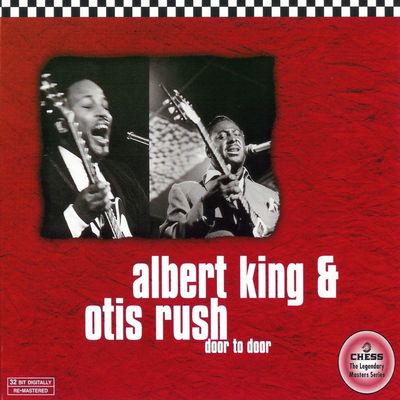
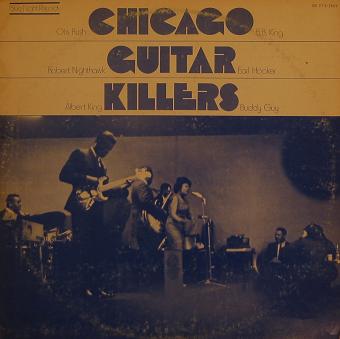
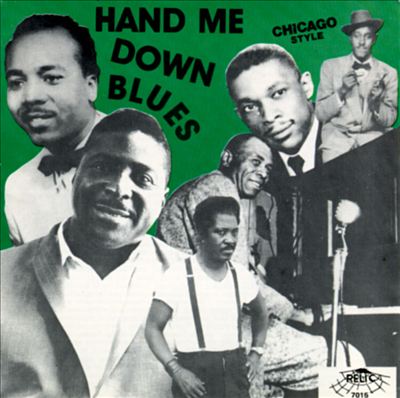
DOOR TO DOOR
Chess
November 1953 / March 1961
CHICAGO GUITAR KILLERS
Blue Night
HAND ME DOWN BLUES
Relic
November 1953
Né à Indianola dans une plantation de coton, Albert grandit dans l'Arkansas à Forrest City puis à Osceola avec douze frères et soeurs. Lorsqu'il a sept ans, ses parents se séparent et il est élevé par sa mère Mary Blevins avec deux soeurs. Après s'être confectionné une guitare rudimentaire avec une vieille boite à cigares, il s'achète son premier instrument à Little Rock. Comme il l'a raconté au magazine Blues Unlimited, Albert écoute, à cette époque, Lonnie Johnson et Howlin' Wolf. A Osceola, il démarre sa carrière musicale en chantant au sein des Harmony Kings (1949-51), une formation de gospel, puis dans une émission de radio sur KOSE. Conducteur de bulldozer, il déménage à Gary (Indiana) à la fin de l'année 1952. Il joue de la batterie derrière John Brim et Jimmy Reed tout en continuant la pratique de la guitare. Après une audition chez Parrott à Chicago, Al Benson (le propriétaire du label) lui propose de graver ses premiers titres (peut être grâce aussi à Willie Dixon). Un seul simple verra le jour et passera totalement inaperçu. D'après la Blues Discography, cette séance regroupait derrière Albert : Johnny Jones (piano), John Brim (guitare), Willie Dixon (basse) et Grace Brim (batterie). Les faces Parrott furent rachetées par Chess en 1959. Mais, la célèbre firme ne les proposera en LP qu'en octobre 1969 avec "Door to door".
Born in Indianola in a cotton plantation, Albert grew up in Forrest City and Osceola, Arkansas with twelve siblings. When he was seven, his parents separate and he is raised by his mother Mary Blevins with two sisters. Having made up a rudimentary guitar with an old cigar box, he bought his first instrument in Little Rock. As he told Blues Unlimited magazine, Albert listened, at that time, Lonnie Johnson and Howlin' Wolf. In Osceola, he started his musical career singing in the Harmony Kings (1949-1951), a gospel formation, then in a radio program on KOSE. Bulldozer driver, he moved to Gary (Indiana) at the end of 1952. He played drums behind John Brim and Jimmy Reed and still practicing the guitar. After a hearing in Parrott in Chicago, Al Benson (the label's owner) asked him to record his first titles (perhaps also thanks to Willie Dixon). One single will come and go totally unnoticed. According to the Blues Discography, this session gathered behind Albert : Johnny Jones (piano), John Brim (guitar), Willie Dixon (bass) and Grace Brim (drums). The Parrott sides were bought by Chess in 1959. But the famous chicagoan label will not propose the LP until october 1969 with "Door to door".
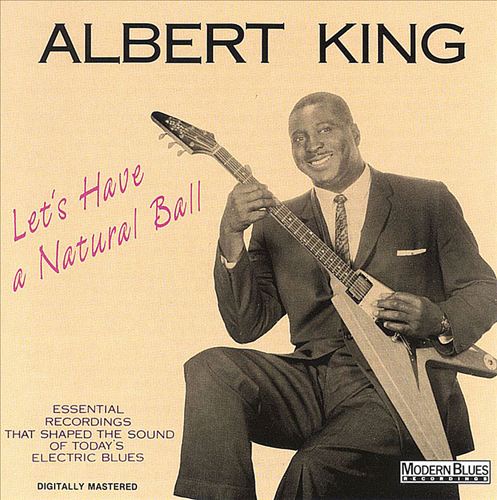
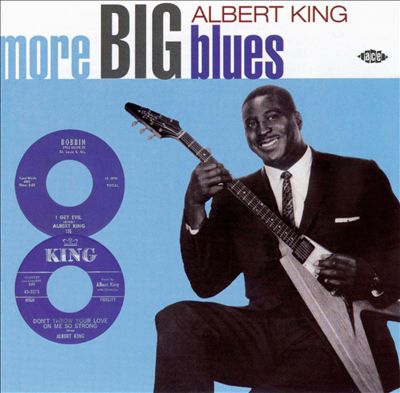
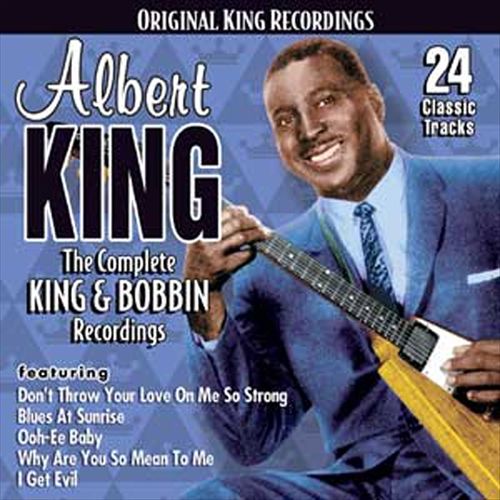
LET'S HAVE A NATURAL BALL
Modern Blues
MORE BIG BLUES
Ace
1959 - July 1962
THE COMPLETE KING & BOBBIN RECORDINGS
Collectables
1959 - April 1963
En 1956, Albert s'installe à Saint Louis où il monte son propre groupe qui comptera dans ses rangs : Sam Wallace ou Jimmy Johnson (piano), Lee Otis Wright (basse), Theodis Morgan (batterie) et les cuivres Wilbur Thompson, Hal White, Freddie Robinette. Après avoir rencontré Bob Lyons qui dirige la radio KATZ et le label Bobbin, il signe un contrat d'exclusivité qui lui permet de retrouver les studios. Grâce à un partenariat avec la firme King, Bobbin possède une excellente distribution et promeut efficacement Albert. Entre 1959 et 1963, il participe à plusieurs séances qui débouchent sur quelques morceaux formidables : "Let's have a natural ball", "What can I do to change your mind", "I walked all night long", "Don't throw your love on me so strong" (son premier grand succès), "Dyna flow", "Why are you so mean to me", "Blues at sunrise" (qui deviendra son cheval de bataille sur scène). Lors de ces séances, son style s'affirme, en particulier son jeu de guitare élégant et velouté parfois influencé par B.B. King. Gaucher, il porte sa guitare à l'envers utilisant le plus souvent une Gibson Flying V prénommée Lucy (en clin d'oeil à la Lucille de B.B. King). On notera que la séance de mars 1961 - particulièrement riche en réussites comme "Searchin' for a woman", "Won't be hangin' around", "Wild women", "California" - sera rachetée par Chess et éditée sur "Door to door" (voir plus haut).
In 1956, Albert moved to Saint Louis where he formed his own group with : Sam Wallace or Jimmy Johnson (piano), Lee Otis Wright (bass), Theodis Morgan (drums) and a hoen section with Wilbur Thompson, Hal White, Freddie Robinette. After meeting Bob Lyons who heads KATZ radio and Bobbin label, he signed an exclusivity contract that allows him to find again the studios. Through a partnership with the King label, Bobbin has an excellent distribution and effectively promotes Albert. Between 1959 and 1963, he participated in several sessions leading to some great songs : "Let's have a natural ball", "What can I do to change your mind", "I walked all night long", "Don't throw your love on me so strong" (his first great success), "Dyna flow", "Why are you so mean to me", "Blues at sunrise" (who became one of his favorite number on stage). During these sessions, his style is taking place, especially his elegant and velvety guitar playing sometimes influenced by B.B. King. Left-handed, he wears his right-handed guitar upside-down using mostly a Gibson Flying V named Lucy (in a nod to the B.B. King's Lucille). Note that the march 1961 session - particularly rich in successes like "Searchin' for a woman", "Won't be hangin' around", "Wild women", "California" - will be bought by Chess and edited in "Door to door" LP (see above).
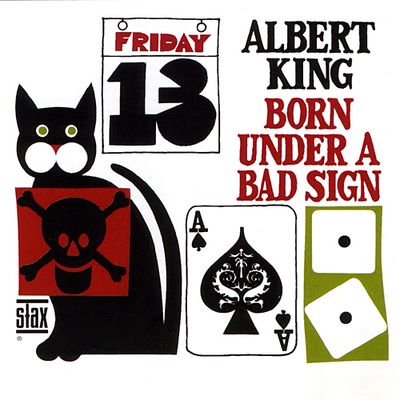
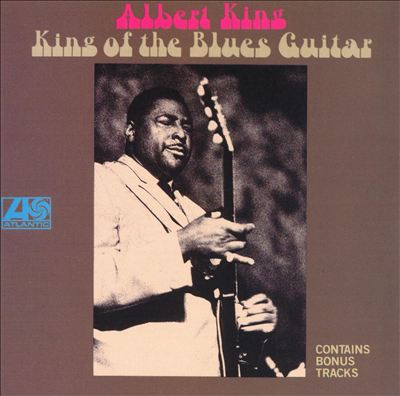
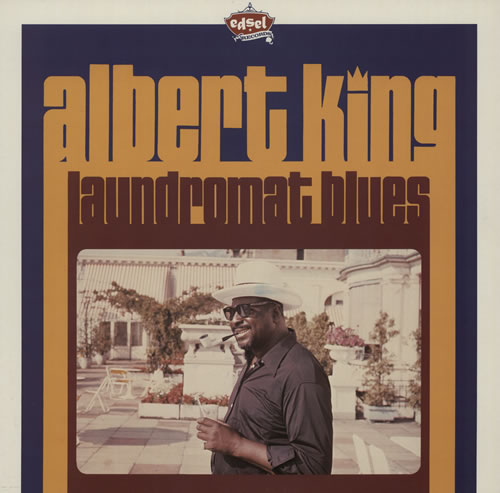
BORN UNDER A BAD SIGN
Stax
March 1966 - June 1967
KING OF THE BLUES GUITAR
Atlantic
LAUNDROMAT BLUES
Edsel
March 1966 - March 1968
A Memphis, Albert fait la rencontre d'Estelle Axton qui lui permet de signer chez Stax. Elle souhaite - avec son partenaire Jim Stewart - ouvrir son label au blues. Ils entourent Albert d'un groupe fantastique : Booker T. Jones (piano, orgue), Steve Cropper (guitare), Donald "Duck" Dunn (basse), Al Jackson (batterie) et les cuivres Andrew Love, Wayne Jackson et Joe Arnold. La production est confiée à l'avisé Al Jackson. Les premiers simples d'Albert chez Stax sont extrêmement conséquents et sont presque tous devenus des standards : "Laundromat blues", "Overall junction", "Oh pretty woman", "Born under a bad sign" (composé par Booker T. Jones et William Bell), "The hunter", "Cold feet". Monument de soul-blues, "Born under a bad sign" n'est, en réalité, pas un vrai album en tant que tel. Il s'agit, en fait, d'un assemblage des premiers simples Stax qui existe en version simple et en version allongée. La firme Atlantic qui possédait les droits de distribution de Stax jusqu'en 1968 a publié un "King of the blues guitar" avec les mêmes séances.
In Memphis, Albert meets Estelle Axton allowing him to sign at Stax. She wishes - with his partner Jim Stewart - open his label to blues artists. They surround Albert with a fantastic group : Booker T. Jones (piano, organ), Steve Cropper (guitar), Donald "Duck" Dunn (bass), Al Jackson (drums) and brass Andrew Love, Wayne Jackson and Joe Arnold. Production is entrusted to the wise Al Jackson. Albert's first Stax singles are extremely consistent and are almost all become standards : "Laundromat blues", "Overall junction", "Oh pretty woman", "Born under a bad sign" (composed by Booker T. Jones and William Bell), "The hunter", "Cold feet". Soul-blues monument, "Born under a bad sign" is in fact not a real album as such. This is, indeed, an assembly of first Stax singles that exists in both simple and in extended version. Atlantic company that owned Stax distribution rights until 1968 published a "King of the blues guitar" with the same sessions.
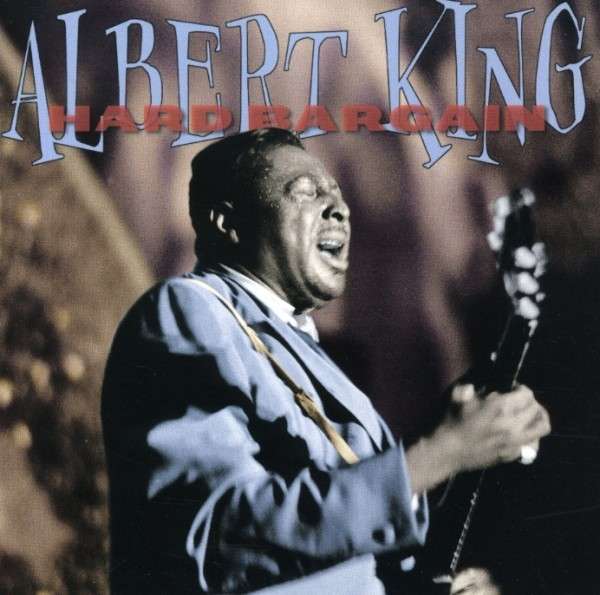
HARD BARGAIN
Stax
June 1967 - January 1971
Ce disque édité tardivement par Fantasy (qui a repris le catalogue Stax) en 1995, compile quelques faces alternatives, faces B et inédits. L'ensemble du matériel date de la période 1967 - 1971. Il s'agit d'une sélection plutôt intéressante mais qu'on ne conseillera qu'aux spécialistes d'Albert King. A noter, une très belle prise de "The sky is crying" mais aussi "I get evil", "Got to be some changes made" et l'instrumental "Albert's groove".
This disc later published by Fantasy (which took over the Stax catalog) in 1995 compiles some alternative takes, B-sides and unreleased tracks. All the material date the period 1967 - 1971. This is a rather interesting selection but we do advise it to Albert King's specialists. Note a very nice version of "The sky is crying" but also "I get evil", "Got to be some changes made" and the instrumental "Albert's groove".
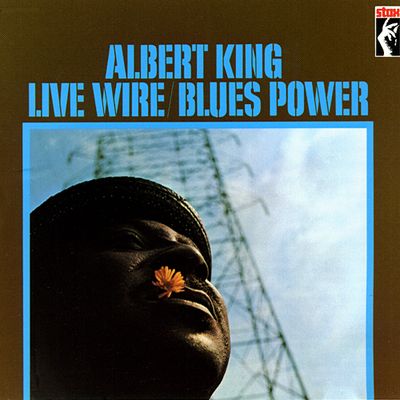
LIVE WIRE / BLUES POWER
Stax
June 1968
Enregistré au Fillmore Auditorium (ou Fillmore West) de San Francisco, ce disque mythique est brillant de bout en bout. Une introduction fantastique ("Watermelon man" d'Herbie Hancock) suivie de morceaux de bravoure exceptionnels comme le célèbre monologue "Blues power", le trépidant instrumental "Night stomp" et le slow-blues "Blues at sunrise". Derrière Albert King - au sommet de son inspiration - joue une formation compacte et puissante : James Washington (orgue), Willie Exon (guitare), Roosevelt Pointer (basse) et Theodis Morgan (batterie). Cet album a influencé des dizaines d'artistes de tous horizons. "Live wire / Blues power" est probablement un des meilleurs concerts de blues gravés sur disque. Vraiment indispensable.
Recorded at the Fillmore Auditorium (or Fillmore West) in San Francisco, this legendary album is brilliant from start to finish. A fantastic introduction ("Watermelon man" by Herbie Hancock) followed by exceptional tracks like the famous monologue "Blues power", the fast-paced instrumental "Night stomp" and the slow-blues "Blues at sunrise". Behind Albert King - on top of his inspiration - plays a compact and powerful backing band : James Washington (organ), Willie Exon (guitar), Roosevelt Pointer (bass) and Theodis Morgan (drums). This album has influenced dozens of artists from all backgrounds. "Live Wire / Blues Power" is probably one of the best blues concerts cut to disc. Really essential.
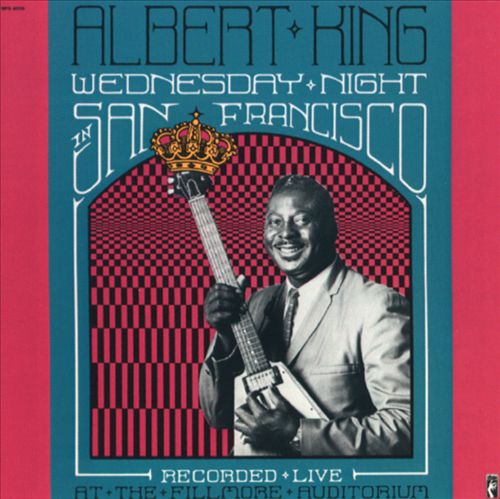
WEDNESDAY NIGHT IN SAN FRANCISCO
Stax
June 1968
Capté pendant la même série de concerts au Fillmore Auditorium que "Live wire / Blues power", ce disque tardivement édité (1990) propose une nouvelle prestation scénique d'Albert King au sommet de sa forme. On y retrouve de belles versions de ses classiques pour Bobbin : "I get evil", "Got to be some changes made", "Don't throw your love on me so strong". Pas aussi intense que le glorieux "Live wire / Blues power" mais excellent tout de même, "Wednesday night in San Francisco" en constitue un parfait complément.
Captured during the same series of concerts at the Fillmore Auditorium as "Live Wire / Blues Power", this disc lately published (1990) proposes a new stage performance of Albert King in top of his form. We find beautiful versions of some of his Bobbin classics : "I get evil", "Got to be some changes made", "Don't throw your love on me so strong". Not as intense as the glorious "Live Wire / Blues Power" but excellent however, "Wednesday night in San Francisco" is its perfect complement.
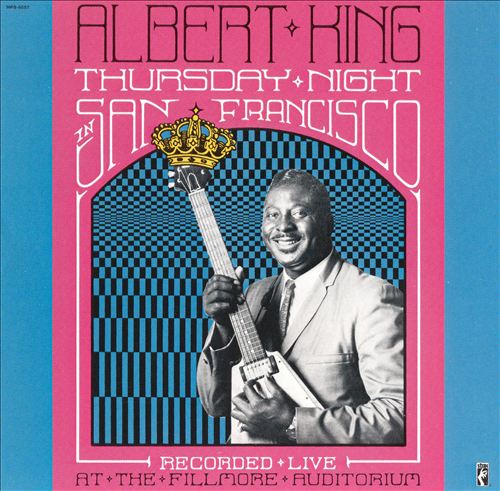
THURSDAY NIGHT IN SAN FRANCISCO
Stax
June 1968
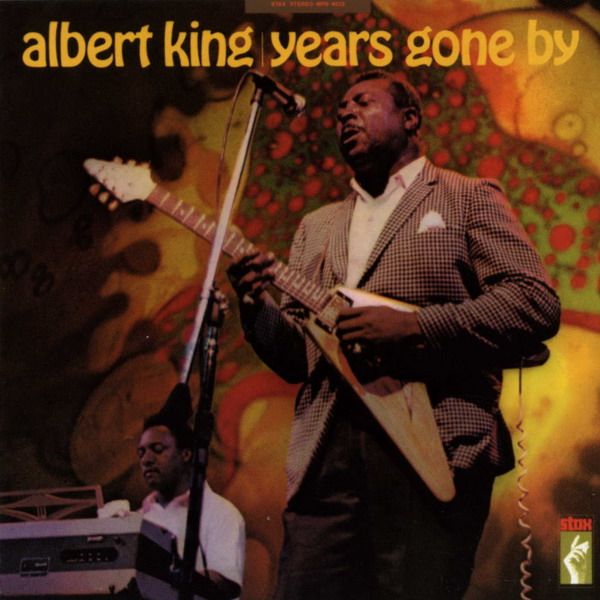
YEARS GONE BY
Stax
1968
Gravé en 1968 avec l'équipe habituelle de Stax (Booker T. & The MG's et les Memphis Horns), cet album figure également parmi les meilleures réussites d'Albert pour la firme de Memphis. Bien qu'il manque un peu d'ampleur par rapport à "Born under a bad sign" ou "I'll play the blues for you", ce "Years gone by" contient quelques titres remarquables : "Wrapped up in love again", "You don't love me", "Drowning on dry land" (en deux versions), "Killing floor", "The sky is crying". A noter qu'il existe une version allongée de ce disque intitulée "Years gone by ... plus".
Cut in 1968 with the usual Stax team (Booker T. & The MG's and the Memphis Horns), this album is also among Albert's best achievements for the Memphis' label. Although it is not as perfect as "Born under a bad sign" or "I'll play the blues for you", this "Years gone by" contains some notable titles : "Wrapped up in love again", "You don't love me", "Drowning on dry land" (two versions), "Killing floor", "The sky is crying". Note that there is an extended version of this record entitled "Years gone by ... plus".
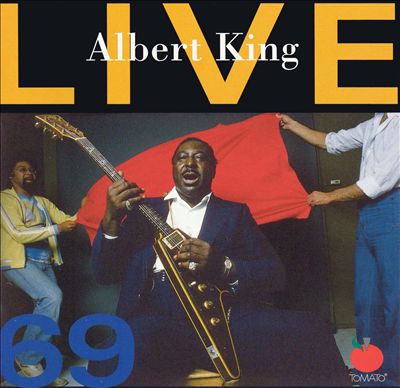
LIVE 69
Tomato
May 1969
Enregistré au Cue Club de Madison (Wisconsin), ce concert ne sort finalement qu'en 2003 en CD. Malgré une qualité sonore parfois juste, le disque s'écoute avec plaisir, culminant avec une longue version de "Please come back to me" (17 minutes). On ne sait pas quels sont les musiciens qui accompagnent Albert lors de cette performance.
Recorded at Cue Club in Madison (Wisconsin), this concert finally comes out in 2003 on CD. Despite a sometimes weak sound quality, the disc is listened with pleasure, culminating with a long version of "Please come back to me" (17 minutes). It is not known what the musicians who accompany Albert during this performance.
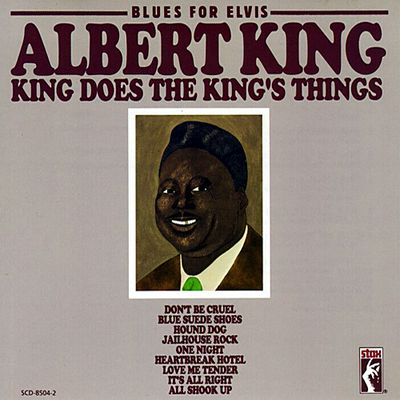
BLUES FOR ELVIS
Stax
1969
Albert s'attache ici à offrir des reprises (où plutôt des ré-interprétations) d'Elvis Presley en imprimant son style soul-blues caractéristique. Il est soutenu dans cette entreprise par la production de Donald "Duck" Dunn et d'Al Jackson. Certains titres fonctionnent bien ("Hound dog", "Heartbreak hotel") mais d'autres apparaissent maladroits ou peu inspirés ("All shook up", "Don't be cruel").
Albert attempts here to offer covers (or rather reinterpretations) of Elvis Presley by printing his characteristic soul-blues style. He is supported in this business by producers Donald "Duck" Dunn and Al Jackson. Some songs work well ("Hound dog", "Heartbreak hotel") but others appear awkward or uninspired ("All shook up", "Don't be cruel").
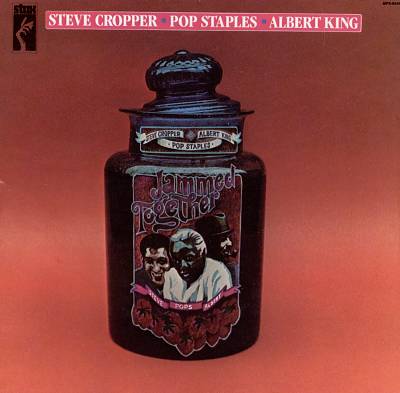
JAMMED TOGETHER
Stax
1969
Jam-session réunissant Albert King, Steve Cropper et Roebuck "Pops" Staples avec une cohorte de producteurs (Al Bell, Isaac Hayes, Al Jackson, Booker T. Jones, David Porter). Il en résulte un album un peu brouillon sans ligne directrice qui peut décevoir. Quelques moments surnagent quand même : "Tupelo", "Big bird", "Knock on wood" et l'instrumental "Opus de soul".
Jam-session involving Albert King, Steve Cropper and Roebuck "Pops" Staples with a cohort of producers (Al Bell, Isaac Hayes, Al Jackson, Booker T. Jones, David Porter). The result is an album without a little rough guideline that can disappoint. Some titles emerge anyway : "Tupelo", "Big bird", "Knock on wood" and the instrumental "Opus de soul".
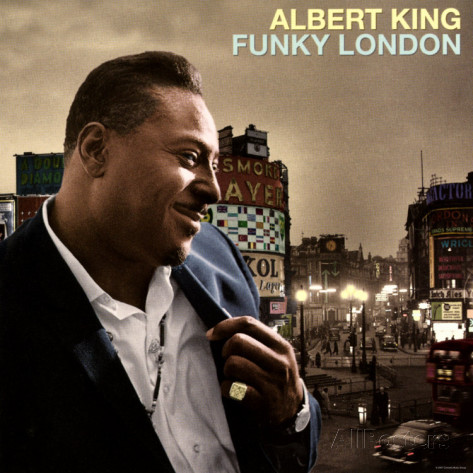
FUNKY LONDON
Stax
January 1970 - July 1974
Comme "Hard bargain", ce disque compile quelques simples et morceaux restés inédits. Les titres, pris entre 1970 et 1974, proviennent des sessions de "I'll play the blues for you", "I wanna get funky" et "The pinch". On ressortira les deux longs blues "Lonesome" et "Lovingest woman in town", percutants et inspirés, ainsi que "Can't you see what you're doing to me" avec la basse appuyée de James Alexander.
Like "Hard bargain", this album compiles some singles and tracks remained unpublished. Titles, taken between 1970 and 1974, come from the sessions of "I'll play the blues for you", "I wanna get funky" and "The pinch". We can point out long blues "Lonesome" and "Lovingest woman in town", punchy and inspired, and "Can't you see what you're doing to me" with the heavy bass of James Alexander.
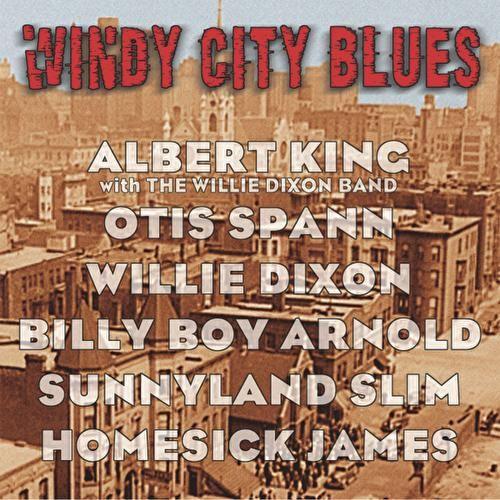
WINDY CITY BLUES
Stax
March 1970
Sur cette anthologie est recueillie une séance atypique d'Albert King produite par Willie Dixon. Lors de celle-ci, il n'est pas accompagné de ses habituels musiciens de Memphis mais par des sidemen chicagoans : Gene Barge, Lafayette Leake, Matt "Guitar" Murphy, "Mighty" Joe Young, Phil Upchurch, Maurice White. Malgré ce changement de taille, la musique d'Albert King garde la même saveur. Quatre morceaux vraiment recommandables.
On this anthology is collected an atypical session of Albert King produced by Willie Dixon. During this, it is not accompanied by his usual Memphis musicians but by chicagoan sidemen : Gene Barge, Lafayette Leake, Matt "Guitar" Murphy, "Mighty" Joe Young, Phil Upchurch, Maurice White. Notwithstanding this change, Albert King's music retains the same flavor. Four tracks really recommendable.
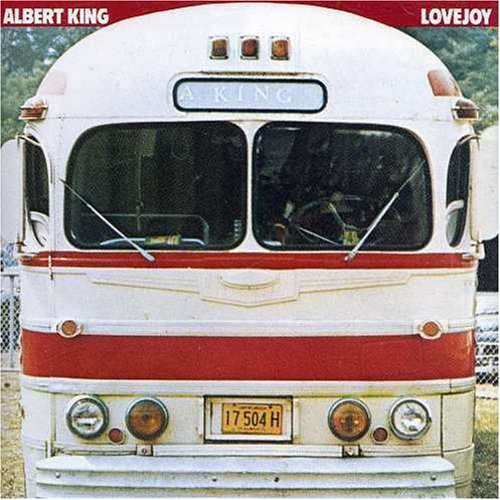
LOVEJOY
Stax
December 1970 - January 1971
Une moitié du disque a été enregistré à Hollywood et l'autre aux célèbres studios de Muscle Shoals (Alabama) sous la supervision de Don Nix. Ce ne sont pas les musiciens habituels d'Albert King (Jim Keltner, Wayne Perkins, Barry Beckett, David Hood, Roger Hawkins) mais leur association s'avère parfois convaincante. Un disque assez mineur, toutefois, d'où émergent quelques réussites notables : "She caught the katy", "For the love of a woman", "Going back to Iuka".
Half of the album was recorded in Hollywood and the other one in the famous studios of Muscle Shoals (Alabama) under the supervision of Don Nix. These are not the usual musicians of Albert King (Jim Keltner, Wayne Perkins, Barry Beckett, David Hood, Roger Hawkins) but their combination is sometimes convincing. A relatively minor disc, however, from which emerge some notable moments : "She caught the katy", "For the love of a woman", "Going back to Iuka".
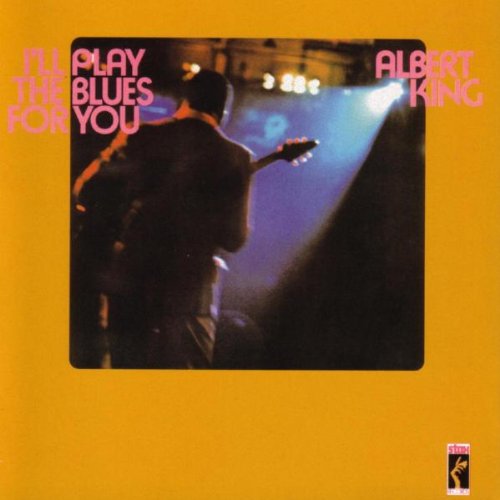
I'LL PLAY THE BLUES FOR YOU
Stax
January - April 1971
Au début des années 70, soucieux de coller aux goûts du public, Albert change d'équipe et s'oriente vers un son plus emprunt de soul-funk. Dorénavant, ce sont les Bar-Kays (James Alexander, Ben Cauley, Michael Toles, Harvey Henderson, Willie Hall), The Movement (le groupe d'Isaac Hayes) ainsi que les excellents producteurs Allen Jones et Henry Bush qui accompagnent Albert King. Le bluesman est, alors, au zénith de son inspiration et livre un nouveau chef d'oeuvre. La chanson-titre est le blues languissant le plus beau jamais écrit. Mais les autres morceaux - formidables - constituent le sommet artistique d'Albert : "Breaking up somebody's home", "High cost of loving", "I'll be doggone", "Answer to the laundromat blues", "Don't burn down the bridge". Les musiciens sont tous remarquables, particulièrement l'association basse - orgue. Un très grand album de soul-blues qui doit figurer dans n'importe quelle collection LP/CD de blues.
In the early 70's, wanting to stick to the public's tastes, Albert changes his team and moving towards a more soul-funk sound. Now, The Bar-Kays (James Alexander, Ben Cauley, Michael Toles, Harvey Henderson, Willie Hall), The Movement (the group of Isaac Hayes) and the excellent producers Allen Jones and Henry Bush accompanying Albert King. The bluesman is then at the zenith of his inspiration and delivers a new masterpiece. The title track is the languid blues the best ever written. But the other songs - tremendous - are the artistic peak of Albert : "Breaking up somebody's home", "High cost of loving", "I'll be doggone", "Answer to the laundromat blues", "Don't burn down the bridge". The musicians are all remarkable, particularly bass - organ association. A great soul-blues album to be included in any LP / CD blues collection.
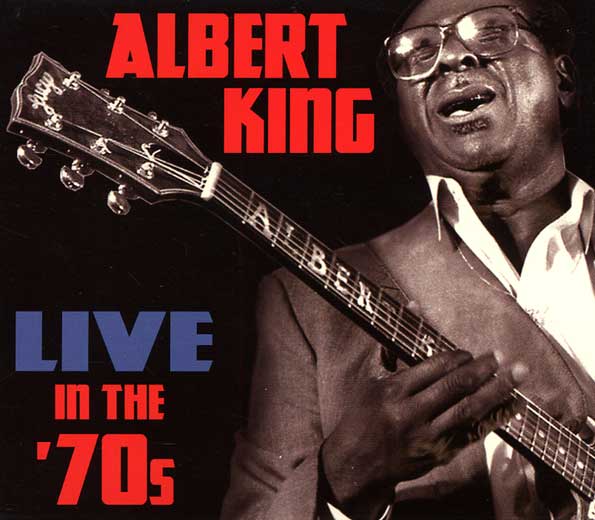
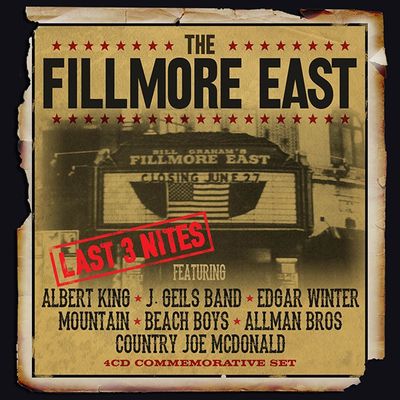
LIVE IN THE 70'S
Rockbeat
June 1971 - 1978
FILLMORE EAST : LAST 3 NITES
Echoes
June 1971
Paru en 2014, ce CD rassemble plusieurs bandes live (inédites pour la plupart) prises entre 1971 et 1978. Globalement, l'écoute est plaisante et la qualité sonore plutôt convenable. La majeure partie du programme est constituée des bandes de 1971 et 1972 qui sont aussi les plus intéressantes. Une captation plus complète du concert de juin 1971 est proposée dans le coffret "Fillmore East : last 3 nites".
Released in 2014, this CD includes several live tapes (mostly unissued) taken between 1971 and 1978. Overall, listening is pleasant and sound quality rather suitable. Most of the program consists of tapes from 1971 and 1972 which are also the most interesting. A more complete recording of the june 1971 concert is proposed in "Fillmore East: last 3 nites" box-set.
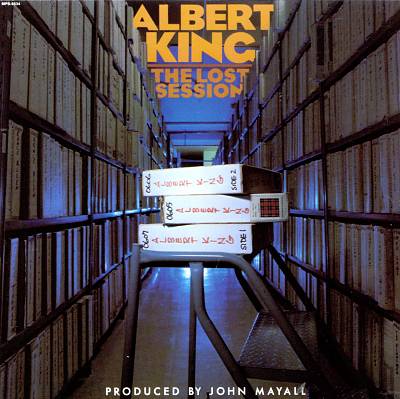
THE LOST SESSION
Stax
August 1971
Produite par John Mayall, cette séance rassemble Albert King, quelques musiciens issus du jazz (Clifford Solomon, Ernie Watts), le bassiste Larry Taylor (ancien Canned Heat) et bien entendu Mayall lui-même. La coloration jazzy semble relativement convaincante et donne à cet album un son bien à lui : "She won't gimme no lovin'", "Cold in hand", "Tell me what true love is" figurent parmi les titres les plus aboutis.
Produced by John Mayall, This session brings together Albert King with some jazz musicians (Clifford Solomon, Ernie Watts), bassist Larry Taylor (former Canned Heat) and of course Mayall himself. The jazzy coloring appears relatively convincing and gives this album a sound all his own : "She won't gimme no lovin'", "Cold in hand", "Tell me what true love is" among the most achieved titles.
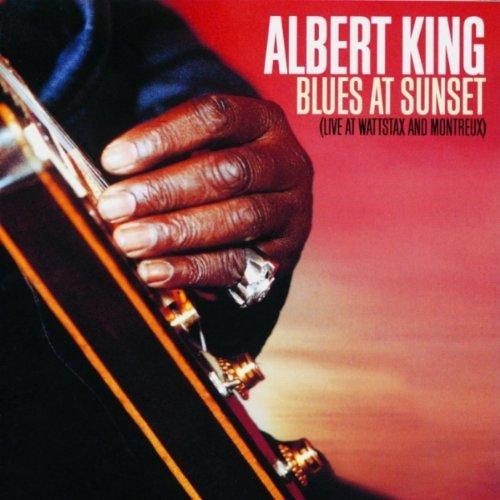
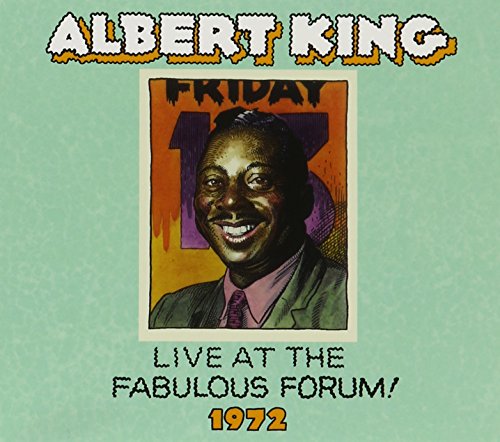
BLUES AT SUNSET
Stax
LIVE AT THE FABULOUS FORUM
Rockbeat
August 1972 - July 1973
Ce recueil est partagé en deux parties : la première captée pendant le Watts Summer Festival (immortalisé par le documentaire "Wattstax" de Mel Stuart) en 1972. L'autre lors de son passage au festival de Montreux l'année suivante. Au-delà de l'aspect historique de ces deux événements, on retrouve ici Albert au meilleur de sa forme scénique. Pour la partie "Wattstax", il ne bénéficie pas de section cuivres, ce qui rend le son plus brut ("Angel of mercy" et "Killing floor" valent l'écoute). La partie enregistrée à Montreux semble légèrement supérieure (une superbe version de "Matchbox blues"). Le label Rockbeat a réédité ces pistes live (avec un morceau de moins) sous le titre "Live at the Fabulous Forum".
This collection is divided into two parts : the first part collected during the Watts Summer Festival (immortalized in the "Wattstax" documentary by Mel Stuart) in 1972. The other part during his performance at Montreux Festival the following year. Beyond the historical aspect of these two events, we find here Albert at his best stage form. For "Wattstax" part he does not benefit from horn section, which makes the sound rawer ("Angel of mercy" and "Killing floor" worth listening). The Montreux part appears slightly higher (a great version of "Matchbox blues"). Rockbeat label has reissued those live sides (one less track) under the title "Live at the Fabulous Forum".
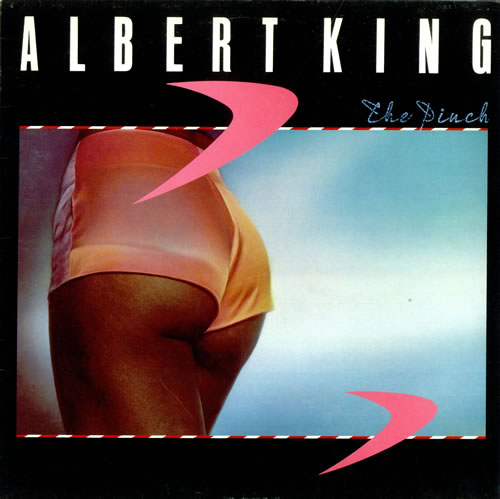
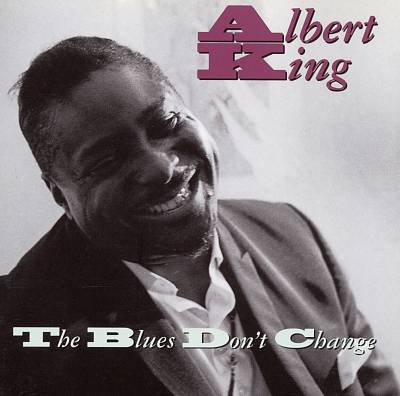
THE PINCH
Stax
THE BLUES DON'T CHANGE
Stax
March 1973 - July 1974
Gravées en 1973-74, ces séances ne sont éditées en microsillon qu'en 1977 sous le titre "The pinch" puis rééditée en CD sous le nouvel intitulé "The blues don't change". Dans la veine soul-blues habituelle, Albert livre un disque correct et agréable. Mineur mais intéressant, on retient particulièrement les deux chansons-titres et sa reprise de "Oh pretty woman".
Cut in 1973-74, these sessions are published in LP in 1977 under the title "The pinch" and then reissued on CD under the new title "The blues don't change". In the usual soul-blues vein, Albert proposes a correct and pleasing album. Minor but interesting, we retain, in particular, the two title-songs and the cover of "Oh pretty woman".
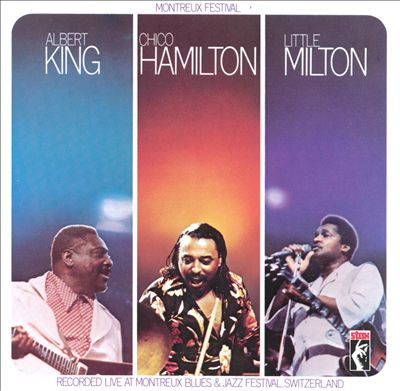
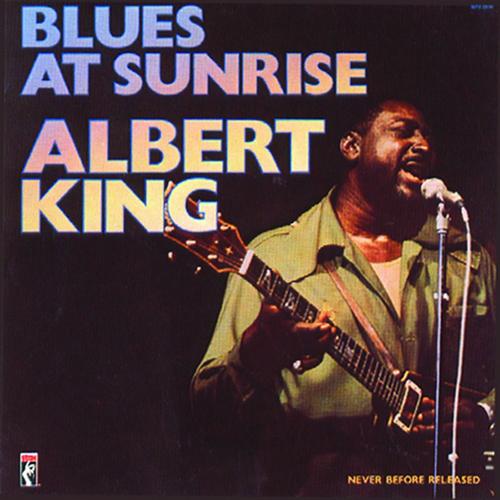
MONTREUX FESTIVAL
Stax
BLUES AT SUNRISE
Stax
July 1973
La représentation qu'il donna au festival de Montreux en juillet 1973 fera l'objet, tout d'abord, d'un album collectif édité par Stax regroupant Albert, Little Milton et le jazzman Chico Hamilton. Par la suite, l'édition de "Blues at sunrise" proposera une version plus complète de ce concert. D'ailleurs, il faut noter que ce concert est repris dans deux disques : "Blues at sunset" et "Blues at sunrise". Malgré une qualité sonore et une production légèrement faibles, il y a de belles réussites comme "Don't burn down the bridge", "I'll play the blues for you" et les deux slow-blues "Blues at sunrise" et "Roadhouse blues".
The performance he gave at the Montreux Festival in july 1973 will be, first, a collective album published by Stax grouping Albert, Little Milton and jazzman Chico Hamilton. Subsequently, the issue of "Blues at sunrise" will offer a more complete version of the concert. Moreover, it should be noted that this concert is included in two CDs : "Blues at sunset" and "Blues at sunrise". Despite slightly lower sound quality and production, there are some great moments such as "Don't burn down the bridge", "I'll play the blues for you" and the two slow-blues "Blues at sunrise" and "Roadhouse blues".
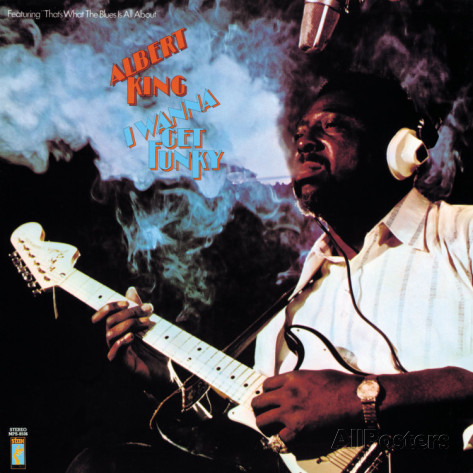
I WANNA GET FUNKY
Stax
November 1973 - 1974
Pour ce nouvel album studio, Albert King et Stax conservent la formule gagnante de "I'll play the blues for you". Effectivement, on retrouve les musiciens habituels (les Memphis Horns, Winston Stewart, Donald Kinsey, James Alexander, Willie Hall) et les deux producteurs-arrangeurs chevronnés Allen Jones et Henry Bush. Le résultat est franchement excellent avec une somptueuse version de "Walking the back streets and crying" et une version funky de "Crosscut saw" (et son intro ébouriffante). Evénement rare : sur la jolie photographie de couverture, on voit Albert jouer sur une Fender Telecaster.
For this new studio album, Albert King and Stax maintain the winning formula of "I'll play the blues for you". Indeed, we find the usual musicians (the Memphis Horns, Winston Stewart, Donald Kinsey, James Alexander, Willie Hall) and two experienced producers arrangers Allen Jones and Henry Bush. The result is frankly excellent with a sumptuous version of "Walking the back streets and crying" and a funky version of "Crosscut Saw" (and its splendid intro). Rare occurence : the pretty cover photograph shows Albert playing on a Fender Telecaster.
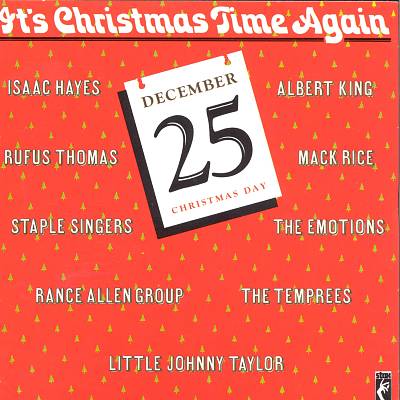
IT'S CHRISTMAS TIME AGAIN
Stax
1973 - 1974
Dans ce disque paru pour Noël, Albert King interprète un superbe "Christmas comes but once a year".
In this album released for Christmas, Albert King interprets a superb "Christmas comes but once a year".
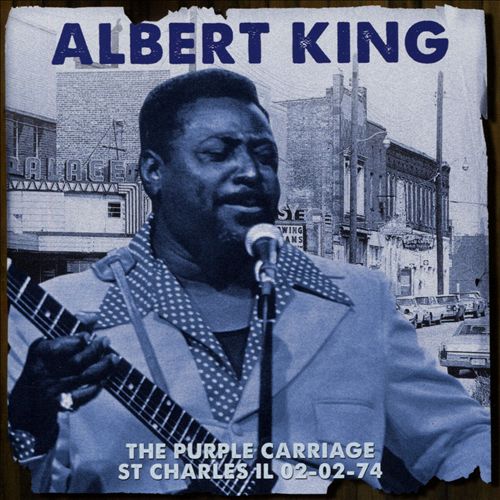
THE PURPLE CARRIAGE
Klondike
February 1974
Edité en 2015, ce concert fur retransmis à la radio avec une qualité sonore passable. Pour autant, la prestation d'Albert est excellente. Certains morceaux étaient parus dans "Live in the 70's". On retient par exemple les versions puissantes de "Don't burn down the bridge" et de "Crosscut saw".
Published in 2015, this concert was broadcasted on radio with a passable sound quality. However, the performance of Albert is excellent. Some tracks were published in "Live in the 70's". Powerful versions can be point out for example "Don't burn down the bridge" and "Crosscut saw".
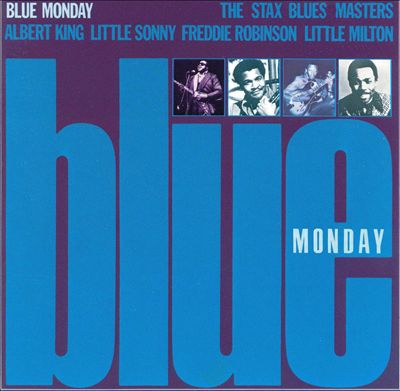
BLUE MONDAY : STAX BLUES MASTERS vol.2
Stax
1974
Dans cette remarquable anthologie, on trouve quatre titres inédits d'Albert King dont de superbes relectures de "Driving wheel" et de "Bad luck".
In this remarkable anthology, we find four previously unissued tracks by Albert King, including superb readings of "Driving wheel" and "Bad luck".
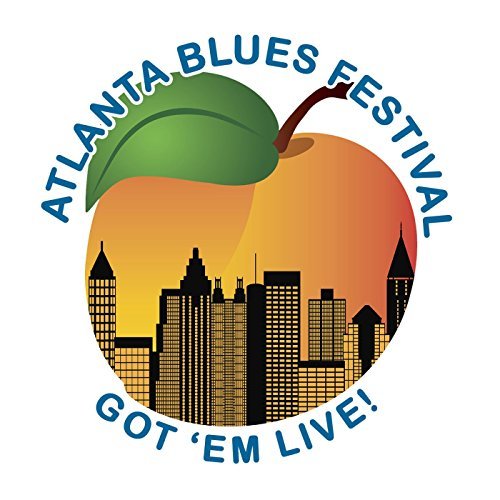
ATLANTA BLUES FESTIVAL : GOT 'EM LIVE
Blues Town
?
On ne connait pas la date de ce concert. Quelques pistes intéressantes comme "Born under a bad sign" et "Stormy monday blues" mis une version tronquée de "I'll play the blues for you".
We do not know the date of this concert. Some interesting tracks like "Born under a bad sign" and "Stormy monday blues" put a truncated version of "I'll play the blues for you".
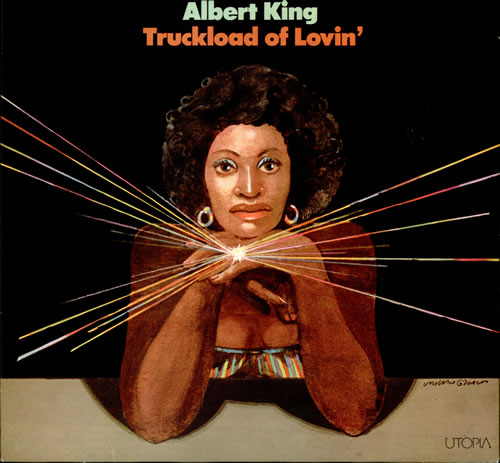
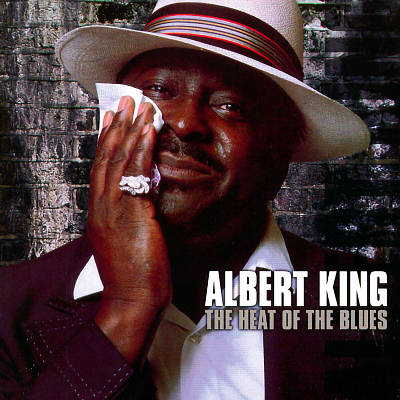
TRUCKLOAD OF LOVIN'
Utopia
Tomato
Charly
THE HEAT OF THE BLUES
Music Avenue
June 1975
En 1974-75, la carrière d'Albert King prend un virage inattendu quand la firme Stax fait faillite. Il signe, alors, chez Utopia, une petite structure appartenant à RCA. Entouré d'une nouvelle équipe de musiciens et des producteurs Bert De Coteaux et Tony Silvestre, le son soul-blues d'Albert devient plus encombré et commercial qu'avant. Enregistré en Californie avec choeurs féminins et violons, l'album s'avère empesé même si Albert reste convaicant au chant et à la guitare. "Cold women with warm hearts" et "Cadillac assembly line" sont, de loin, les meilleurs titres. Le dessin de couverture est signé par le graphiste Milton Glaser.
In 1974-75, the career of Albert King takes an unexpected turn when Stax went bankrupt. So, he signs for Utopia, a small company owned by RCA. Surrounded by a new team of musicians and producers Bert De Coteaux and Tony Silvestre, his soul-blues sound becomes heavier and more commercial than before. Recorded in California with female vocals and violins, the album is clumsy though Albert remains convincing on vocals and guitar. "Cold women with warm hearts" and "Cadillac assembly line" are by far the best titles. The cover drawing is signed by the graphic designer Milton Glaser.
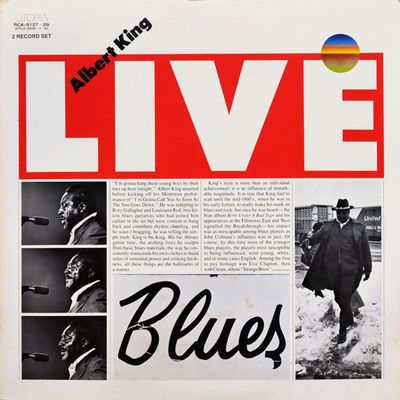
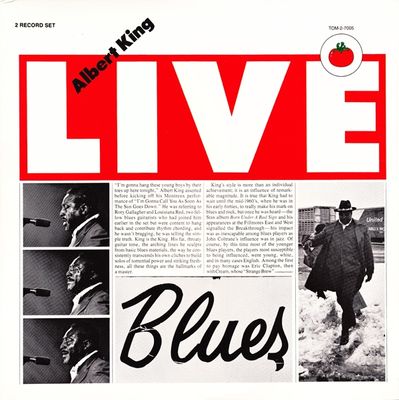
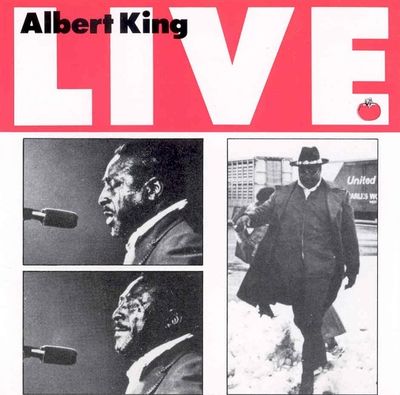
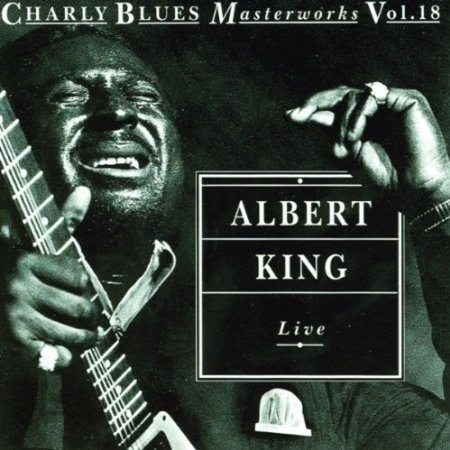
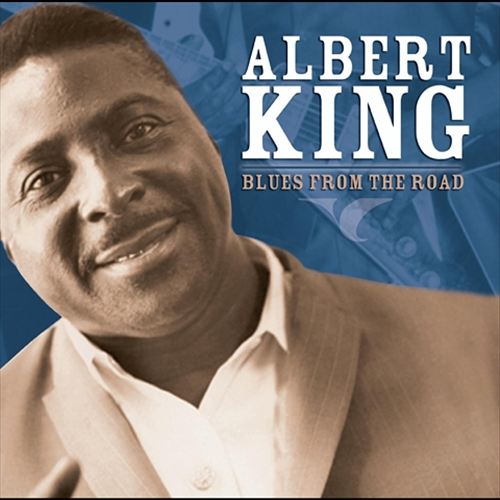
ALBERT LIVE
Utopia
Tomato
Charly
BLUES FROM THE ROAD
Fuel 2000
July 1975
Il s'agit de la deuxième venue d'Albert au prestigieux festival de Montreux. Impérial à la guitare, il est accompagné par le fidèle James Washington (claviers), Lonnie Turner (batterie), Joe Turner (basse) et les cuivres Nate Fitzgerald, Steve Wilson, Wayne Preston. Il est aussi rejoint sur scène par quelques invités de marque comme Lowell Fulson, Louisiana Red et Rory Gallagher. "Blues at sunrise", "Stormy monday", "Matchbox hold my clothes", "I'll play the blues for you" sont remarquables. La jam-session avec Gallagher, Fulson et Red - "Jam in a flat" (au-delà des 15 minutes) - est également digne d'interêt. Le CD Charly Blues Masterworks vol.18 ne propose pas l'intégralité de la performance. Il vaut mieux opter pour les autres éditions. A noter que la dernière réédition "Blues from the road" reprend effectivement l'intégralité du programme mais dans un ordre totalement différent.
This is the second coming of Albert at the prestigious Montreux festival. Brilliant on guitar, he is accompanied by the faithful James Washington (keyboards), Lonnie Turner (drums), Joe Turner (bass) and blowers Nate Fitzgerald, Steve Wilson, Wayne Preston. He is also joined on stage by some distinguished guests as Lowell Fulson, Louisiana Red and Rory Gallagher. "Blues at sunrise", "Stormy monday", "Matchbox hold my clothes", "I'll play the blues for you" are remarkable. The jam-session with Gallagher, Fulson and Red - "Jam in a flat" (beyond 15 minutes) - is also worthy of interest. The CD Charly Blues Masterworks vol.18 does not offer the full performance. It is better to choose for other editions. Note that the last reissue "Blues from the road" actually shows the entire program, but in a totally different order.
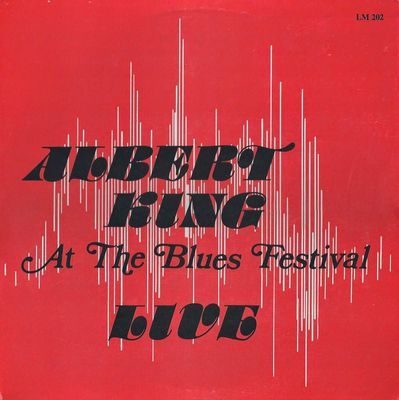
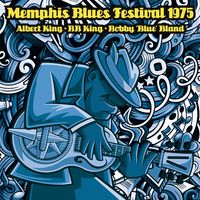
LIVE AT THE BLUES FESTIVAL
Parrall
MEMPHIS BLUES FESTIVAL
Klondike
November 1975
Cet obscur LP reprend un concert d'Albert King à l'International Blues Festival de Memphis en novembre 1975. La prise de son n'est pas de bonne qualité et gâche le plaisir de l'auditeur. En outre, la pochette originale ne donne aucune indication sur les musiciens jouant derrière Albert.
This obscure LP resumes a concert of Albert King at Memphis International Blues Festival in november 1975. The sound is not good and spoils the pleasure of the listener. In addition, the original sleeve notes give no indication of the musicians playing behind Albert.


ALBERT
Utopia
Tomato
Charly
THE HEAT OF THE BLUES
Music Avenue
May 1976
Gravé à Hollywood (Californie) sous la direction de Bert De Coteaux, ce second album studio pour Utopia est dans la parfaite continuation de "Truckload of lovin'" : production envahissante, choeurs féminins, cordes, cuivres, flûtes, percussions, section rythmique puissante. Néanmoins, les compositions sont globalement meilleures que dans l'album studio précédent et méritent l'écoute : "Ain't nothing you can do", "I don't care what my baby do", "Change of pace", "Ain't it a real good sign".
Recorded in Hollywood (California) under the direction of Bert De Coteaux, this second studio album for Utopia is in the perfect continuation of "Truckload of lovin'" : invasive production, female choirs, strings, brass, flutes, percussion, powerful rhythm section. Nevertheless, the compositions are generally better than in the previous studio album and deserve listening : "Ain't nothing you can do", "I don't care what my baby do", "Change of pace", "Ain't it a real good sign".
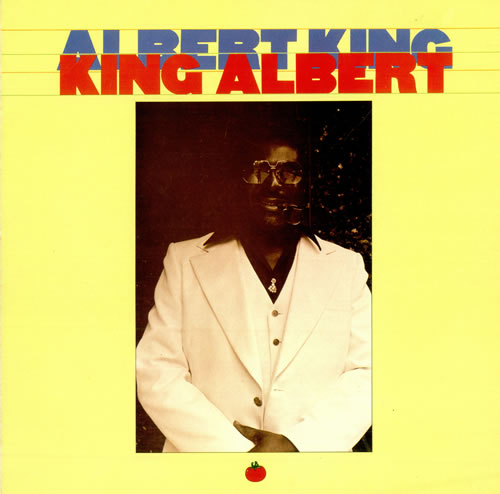

KING ALBERT
Tomato
Charly
THE HEAT OF THE BLUES
Music Avenue
May - June 1977
Produit par Don Davis à Detroit, ce "King Albert" possède un son soul-blues intéressant avec notamment une belle section cuivres (Fred Wesley & The Horny Horns) et le groupe vocal Brandye. La section rythmique est mixée en avant, en particulier le bassiste Anthony Willis. Un disque plutôt consistant contenant plusieurs interprétations convaincantes : "Love shock", "You upset me baby", "Chump change".
Produced by Don Davis in Detroit, this "King Albert" has an interesting soul-blues sound along with a fine horn section (Fred Wesley & The Horny Horns) and Brandye vocal group. The rhythm section is mixed on the foreground, especially bassist Anthony Willis. A consistent album containing several rather convincing interpretations : "Love shock", "You upset me baby", "Chump change".
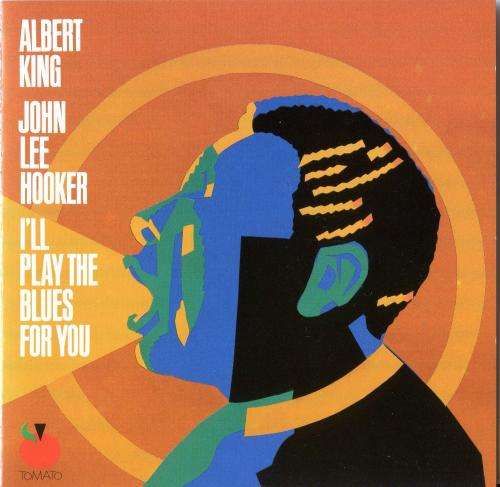
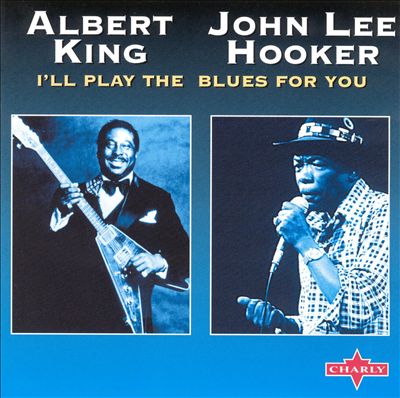
I'LL PLAY THE BLUES FOR YOU
Tomato
Charly
October 1977
Ce microsillon présente Albert King et John Lee Hooker lors de concerts donnés en octobre 1977 à Chicago (4 morceaux pour Albert et 5 pour Hooker). Accompagné de son groupe de scène habituel (mené par James Washington), Albert délivre une sympathique performance ("Born under a bad sign"). On note que "I'll play the blues for you" est renommé pour l'occasion "When you down".
This LP presents Albert King and John Lee Hooker at concerts in Chicago in october 1977 (4 tracks for Albert and 5 for Hooker). Accompanied by his usual stage group (led by James Washington), Albert delivers a nice performance ("Born under a bad sign"). Note that "I'll play the blues for you" is renamed for the occasion "When you down".
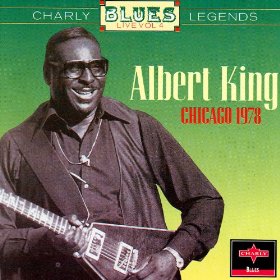
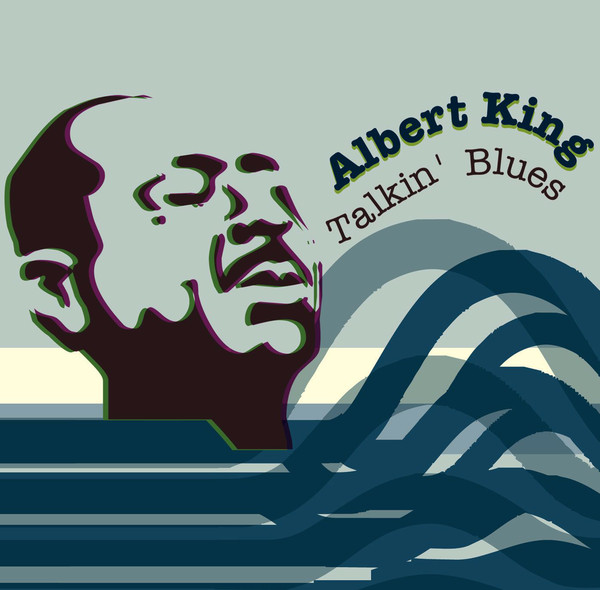
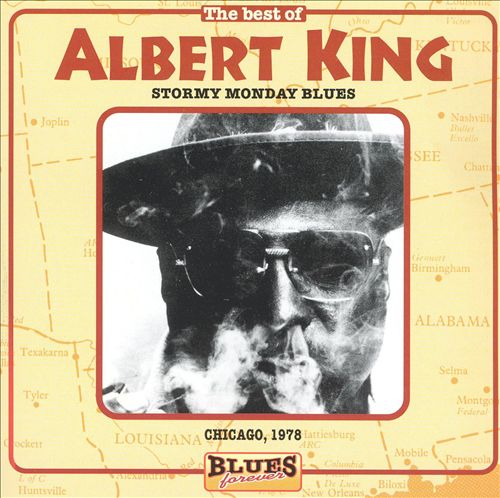
CHICAGO 1978
Charly
TALKIN' BLUES
Thirsty Ear
STORMY MONDAY BLUES
Blues Forever
February 1978
Recueil reprenant un concert donné à Chicago en février 1978. Malheureusement, les notes de pochette de Ron Bartolucci ne donnent aucun détail sur les noms des musiciens présents sur scène aux côtés d'Albert. Parfois un peu plat, il y a, tout de même, quelques bons moments par ci par là : "Born under a bad sign", "You're my woman I'm your mate", "Please come back to me". Le CD Blues Forever est parfaitement identique au CD Charly initial. Par contre, la version proposée par Thirsty Ear possède trois titres de moins mais ajoute des extraits d'interviews d'Albert par Peter Gordon.
Collection capturing a concert in Chicago in february 1978. Unfortunately, the liner notes by Ron Bartolucci give no details on the names of musicians on stage alongside Albert. Sometimes a little flat, there are, however, some good moments here and there : "Born under a bad sign", "You're my woman I'm your mate", "Please come back to me". The Blues Forever CD is perfectly identical to the original Charly CD. On the contrary, the version proposed by Thirsty Ear omits three titles but adds Albert interviews extracts by Peter Gordon.
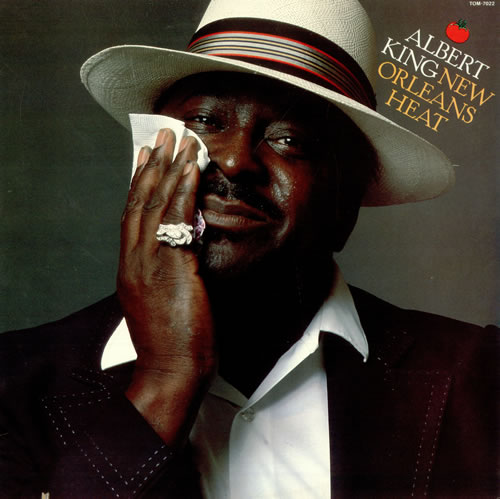

NEW ORLEANS HEAT
Tomato
Charly
THE HEAT OF THE BLUES
Music Avenue
1978
Pour son dernier album chez Tomato, Albert enregistre à La Nouvelle Orléans (au Sea-Saint Studios) sous l'égide d'Allen Toussaint assisté d'Arthur "Skip" Gordon et de Cosimo Matassa. D'excellents musiciens du crû ont été recrutés : Allen Toussaint, Wardell Quezergue, George Porter Jr, Leo Nocentelli. On note aussi une très jolie pochette de Milton Glaser. Malgré tout cela, "New Orleans heat" s'avère assez ennuyeux dans l'ensemble (à l'exception de "I got the blues" et "Angel of mercy" plus aboutis).
For his latest album with Tomato, Albert recorded in New Orleans (at Sea-Saint Studios) under the aegis of Allen Toussaint assisted by Arthur "Skip" Gordon and Cosimo Matassa. Excellent local musicians were recruited : Allen Toussaint, Wardell Quezergue, George Porter Jr, Leo Nocentelli. There is also a lovely cover art of Milton Glaser. Despite all this, "New Orleans heat" is fairly boring as a whole (with the exception of "I got the blues" and "Angel of mercy" more achieved).
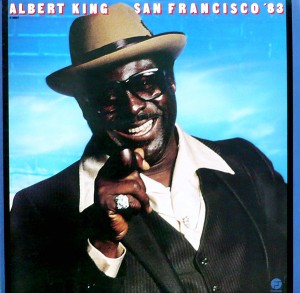
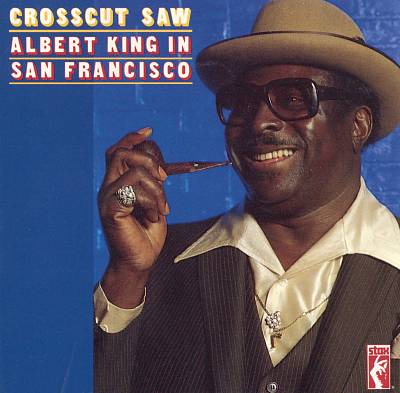
SAN FRANCISCO '83
Fantasy
CROSSCUT SAW : ALBERT KING IN SAN FRANCISCO
Stax
March 1983
Après ces années un peu hésitantes chez Utopia / Tomato, Albert King décide de se retirer provisoirement des studios. Après cinq années d'absence discographique, il se constitue un groupe homogène et attentif (Tony & Michael Llorens, Larry Burton, Gus Thornton). Cette fois, Albert produit lui-même le disque avec sobriété et justesse. Un album vraiment consistant ponctué de belles réussites comme "I'm gonna move to the outskirts of town", "They made the Queen welcome", "Floodin' in California" et "Matchbox blues". La version CD ajoute deux morceaux additionnels (une nouvelle version syncopée de "Crosscut saw").
After those hesitant years at Utopia / Tomato, Albert King decides to withdraw temporarily from the studios. After five years of discographical absence, he gathers a homogeneous and attentive backing band (Tony & Michael Llorens, Larry Burton, Gus Thornton). This time, Albert product himself the disc with sobriety and accuracy. A very consistent album punctuated of great moments like "I'm gonna move to the outskirts of town", "They made the Queen welcome", "Floodin' in California" and "Matchbox blues". The CD version adds two additional songs (a new syncopated version of "Crosscut saw").
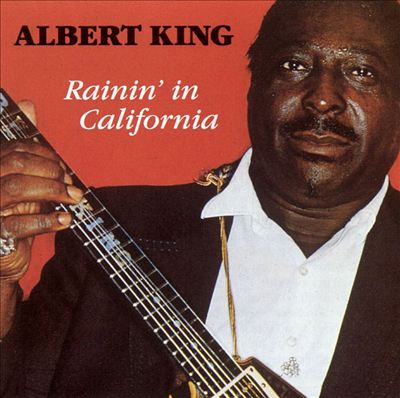
RAININ' IN CALIFORNIA
Wolf
September 1983
Ce disque reprend un concert au Long Beach Blues Festival en 1983. En dépit d'une introduction trop longue et de quelques imperfections, il s'agit d'une belle prestation d'Albert King sur scène. On peut ressortir son excellente reprise de "The sky is crying" ainsi qu'un intéressant "Rainin' in California". Au final, un album mineur mais qui vaut l'écoute.
This disc contains a concert at the Long Beach Blues Festival in 1983. Despite a too lengthy introduction and some imperfections, it is a good performance of Albert King on stage. We can point out an excellent cover of "The sky is crying" and an interesting "Rainin' in California". Finally, a minor but worth listening album.
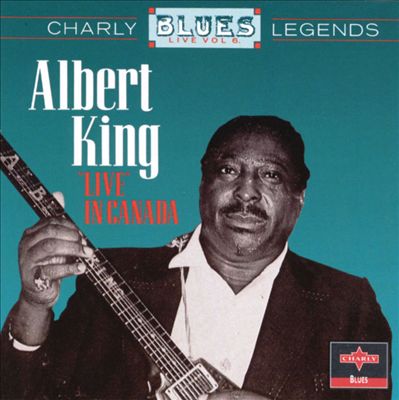
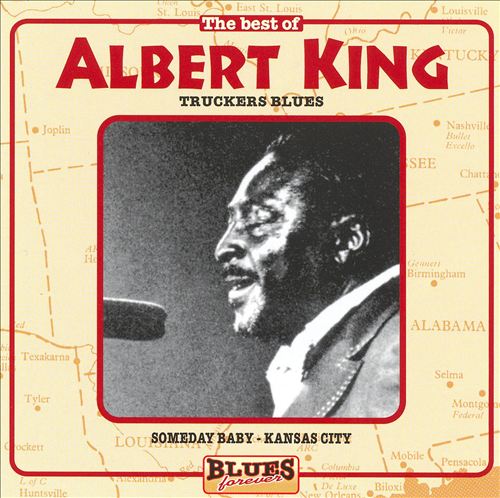
LIVE IN CANADA
Charly
TRUCKERS BLUES
Blues Forever
1983
Obscur concert au Canada datant probablement de 1983. Les notes de pochette de Ron Bartolucci n'apportent aucune information intéressante sur les musiciens ou le lieu d'enregistrement. La qualité sonore est franchement médiocre et les morceaux trop longs. L'édition CD Blues Forever ne reprend qu'une partie des titres.
Obscure concert in Canada probably dated from 1983. Ron Bartolucci sleeve notes provide no useful information about the musicians or the recording place. The sound quality is very poor and different tracks too long. The Blues Forever CD edition contains only a part of the concert.
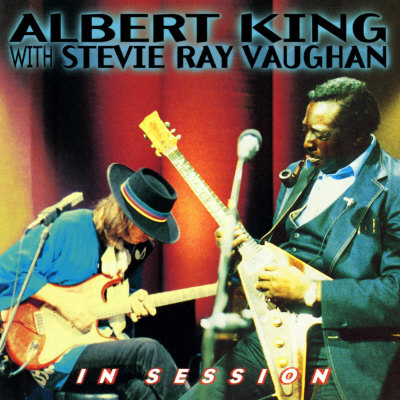
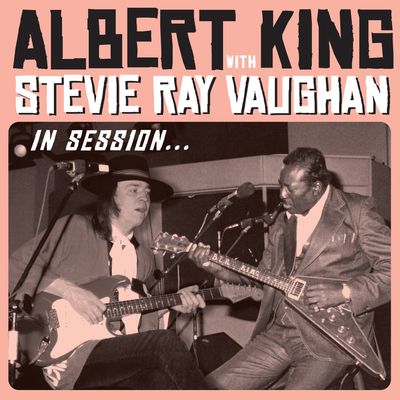
IN SESSION
Stax
Fantasy
December 1983
Captation d'une jam-session télévisée de décembre 1983 rassemblant Albert King et Stevie Ray Vaughan. Les deux guitaristes se complètent convenablement, parfaitement accompagnés par le groupe régulier d'Albert dans une chaude ambiance d'émulation. La profusion de solos de guitare et des morceaux souvent allongés peuvent éventuellement lasser l'auditeur. Entre les titres, on trouve quelques intermèdes sous la forme de discussions entre les deux artistes. Edité en 1999 par Fantasy, le disque sera augmenté d'un DVD en 2010.
Televised jam session in december 1983 gathering Albert King and Stevie Ray Vaughan. The two guitarists appropriately complement themselves perfectly accompanied by Albert's regular group in a warm atmosphere of emulation. The profusion of guitar solos and some extended tracks can eventually tired the listener. Between the songs, there are some interludes in the form of discussions between the two artists. Published in 1999 by Fantasy, the album will be enhanced in 2010 with a DVD.
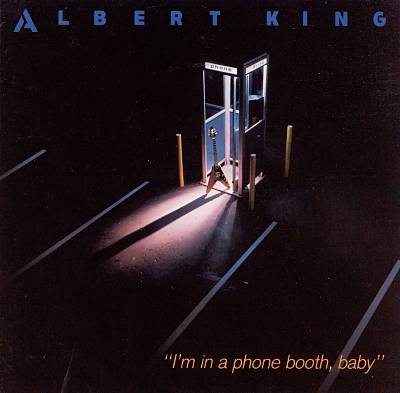
I'M IN A PHONE BOOTH BABY
Fantasy
January 1984
Co-produit par Albert King et Tony Llorens, le disque commence par une chanson-titre - une reprise de Robert Cray - fort bien exécutée. On trouve aussi deux excellentes reprises d'Elmore James ("Dust my broom" et "Sky is crying"). Toujours en bonne forme, Albert conserve le son particulier de sa guitare et sa voix chaude. Un de ses meilleurs albums récents.
Co-produced by Albert King and Tony Llorens, the disc begins with a title track - a cover of Robert Cray - well executed. There are also two excellent covers of Elmore James ("Dust my broom" and "Sky is crying"). Always in fine form, Albert keeps his particular guitar sound and his warm voice. One of his best recent albums.
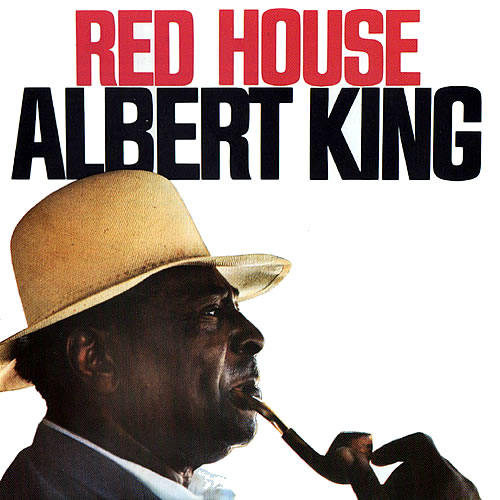
RED HOUSE
Essential
1989
Gravé entre Memphis et Los Angeles, cet ultime album studio d'Albert King est placé sous la supervision d'Alan Douglas (avec Gary Belz et Bruce Gary). La production a opté pour un style Blues contemporain puissant dans lequel la voix et la guitare d'Albert s'épanouissent convenablement. On retient notamment "Bluesman", "When you walk out the door", "Problems", "Trouble" ainsi qu'une reprise du "Red house" de Jimi Hendrix.
Recorded between Memphis and Los Angeles, this ultimate studio album by Albert King is placed under the supervision of Alan Douglas (with Gary Belz and Bruce Gary). The production opted for a powerful contemporary Blues style in which Albert's voice and guitar perform appropriately. We notably point out "Bluesman", "When you walk out the door", "Problems", "Trouble" and a cover of Jimi Hendrix's "Red house".
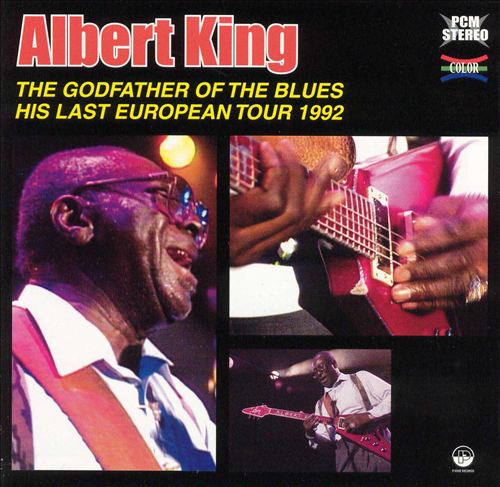
THE GODFATHER OF THE BLUES : HIS LAST EUROPEAN TOUR 1992
P-Vine
July 1992